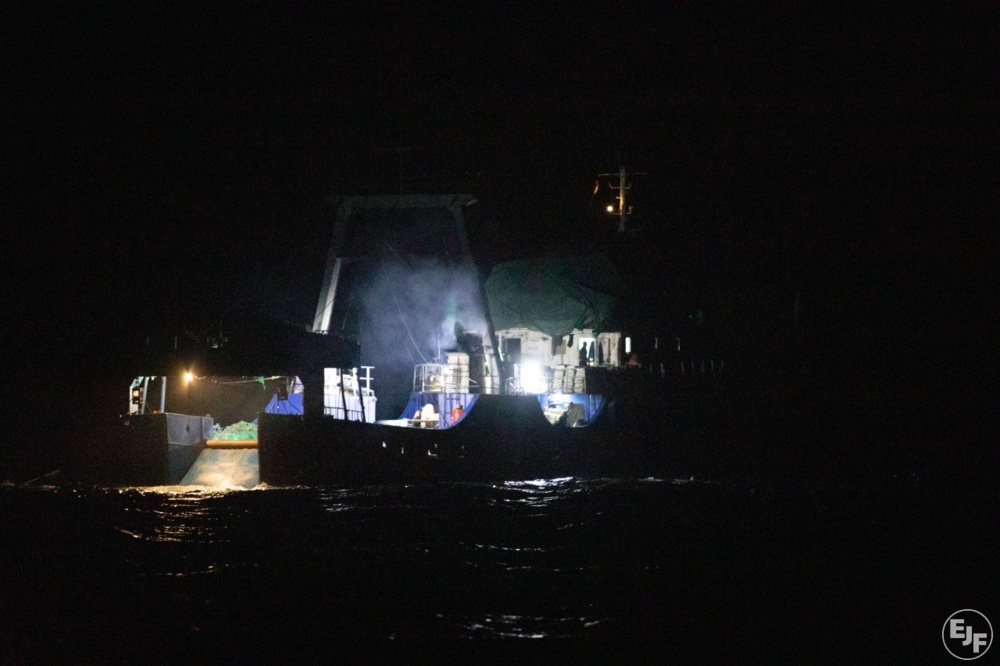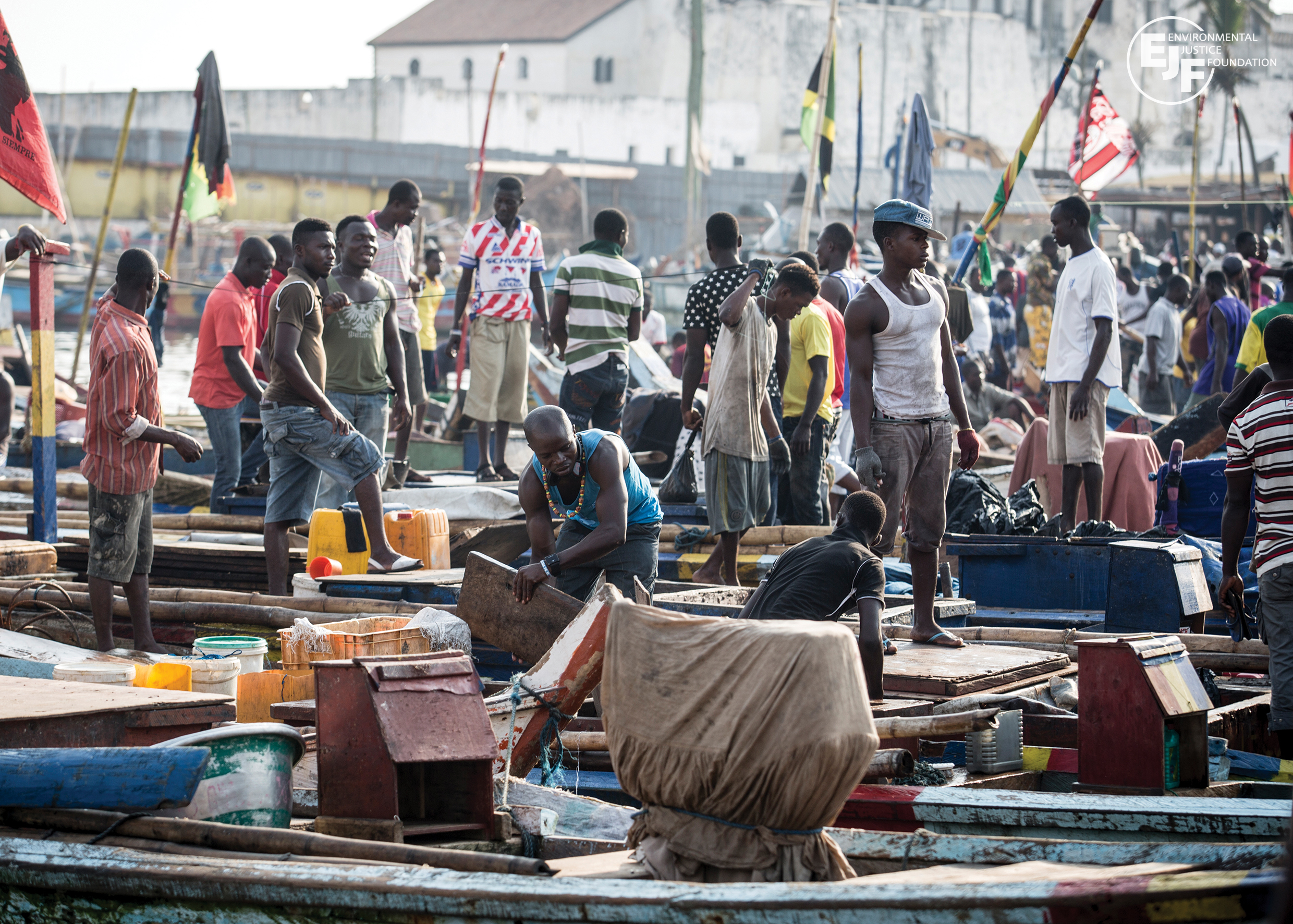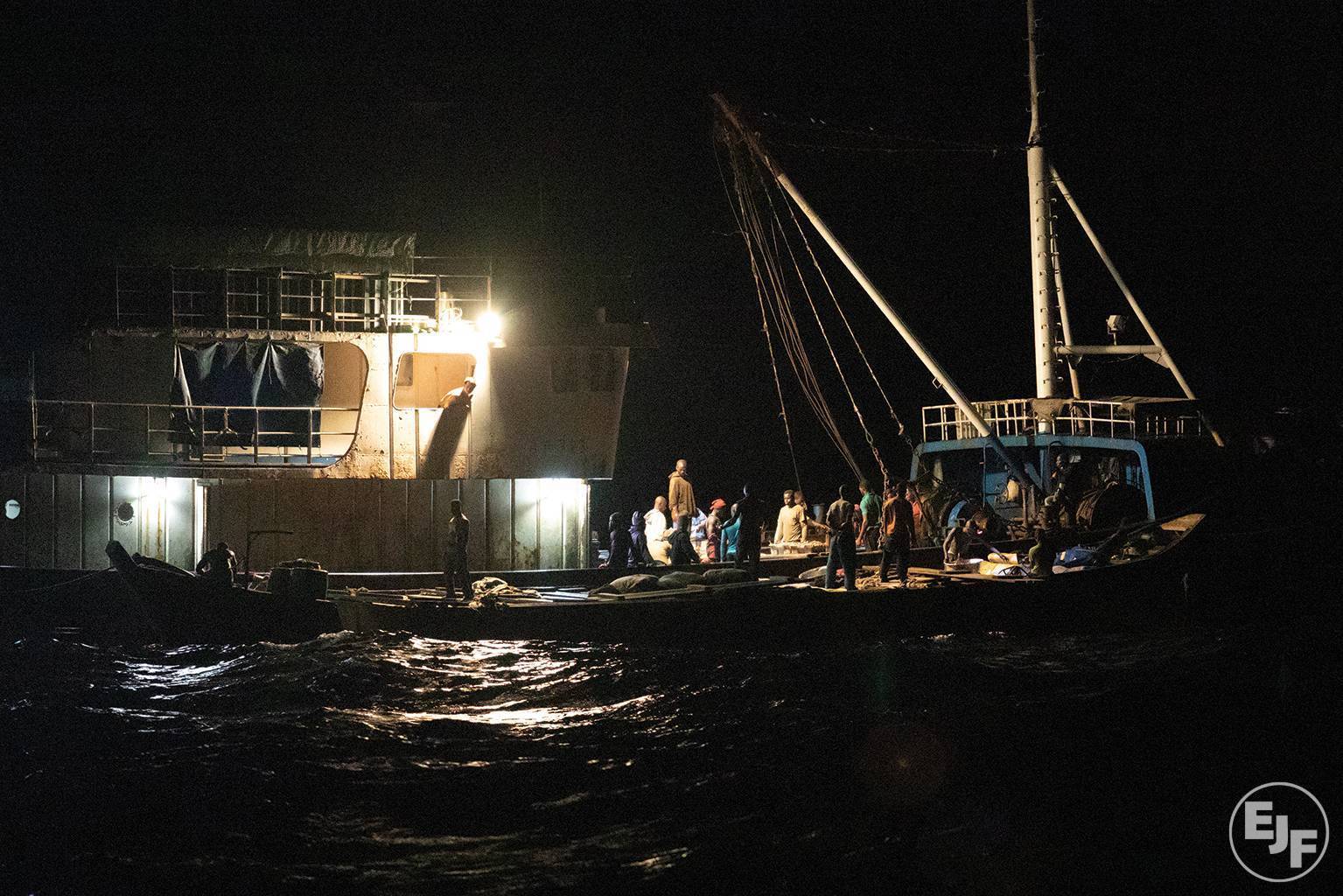
Trawlers charged with illegal fishing continue to dodge fines in Ghana
Last year, the vessel Lu Rong Yuan Yu 956 was caught in Ghanaian waters with illegal nets and undersized ‘small pelagic’ fish on board – the staple catch of local canoe fishers. The US$1 million fine originally imposed is the statutory minimum under Ghanaian law. However, the owners have refused to pay. This is a systemic problem for Ghana, in which the true beneficiaries of illegal fishing go almost entirely unpunished, the Environmental Justice Foundation (EJF) has said.
Ghana’s ‘small pelagic’ fish stocks – a staple food for local coastal communities – are on the brink of collapse. Researchers predict their total loss in under a decade unless urgent action is taken.
This is due in large part to illegal fishing – and especially the destructive trans-shipment practice known as saiko. The Lu Rong Yuan Yu 956 is the latest in a string of cases where the offenders are either given a much lower fine or refuse to pay entirely, and are later re-licensed to fish.
If Ghana’s government wants to protect its fish stocks, food security and coastal communities it needs to urgently crack down on these practices, says EJF.
In 2017 the owners of a Ghanaian-flagged industrial trawler, Meng Xin 16, refused to pay a fine imposed by an out-of-court settlement committee in a case of illegal trans-shipment. The vessel has since paid an undisclosed sum and been re-licensed to continue fishing. Another vessel, the Meng Xin 29, which was fined for illegal fishing in 2019, has paid a lower sum and since been re-licensed to fish.
Around 90% of Ghana’s industrial fishing fleet is linked to Chinese ownership, an EJF investigation revealed in 2018 . As Ghana’s fisheries laws prohibit foreigners from engaging in joint ventures in the industrial trawl sector, Chinese organisations operate through Ghanaian ‘front’ companies, using opaque corporate structures to import their vessels, register and obtain a licence.
These underhand dealings have precluded attempts to ensure the true beneficiaries of illegal activities are held to account, says EJF.
Both the Meng Xin 16 and Meng Xin 29 are linked to a Chinese company a recent investigation by China Dialogue revealed. In the current case, the Lu Rong Yuan Yu 956 is also operated by a Chinese company, Rongcheng Ocean Fishery Co Ltd.
The company also owns another vessel which was caught in 2015 taking under-sized fish – juveniles that are crucial to replenish fish populations. They paid only GHS 200,000 (US$ 35,394) in fines, well below the US$1 million minimum stated in the law.
Executive Director of EJF, Steve Trent says: “Such has been the devastating impact of illegal fishing activities that Ghana now has to import around halfof its fish, and local fishing communities are increasingly victims of the impact of rapidly declining fish populations. According to the Fisheries Act, failure to pay the fine within 30 days results in the matter reverting to the court. It is now essential that the court uses all legal options available to require payment of the fine and accompanying sanctions to ensure deterrence.”
Notes for editors
- The trawler, the Lu Rong Yuan Yu 956, was apprehended on 17 June 2019 with 405 boxes and 864 slabs of frozen mixed small pelagic fish species on board, generally below the minimum landing size. Other fisheries infractions included non-reporting of catch on board, and use of under-sized mesh nets.
- The Fisheries Commission confirmed that the vessel had docked at Tema port but failed to report a portion of its catch. It had then left Tema with the fish on board, with the intention of trans-shipping the fish at sea to a saiko canoe.
- In addition to the fine in the 2014 Amendment Act, Ghana’s fisheries laws provide for forfeiture of catches and fishing gear, and terms of imprisonment for violations relating to the capture of juvenile fish and use of prohibited trawl gear.
- The failure to pay in this case is representative of a broader issue in Ghana’s fisheries sector, where local operators front for Chinese companies to obtain licences to fish in Ghanaian waters. Trawlers operating under these local licences using the Ghanaian flag should be 100% locally beneficially owned. Although the registered ownership is, on paper, Ghanaian, in the majority of cases the controlling entity (or beneficial owner) is Chinese. A report by EJF found that, in 2015, Chinese nationals captained over 95% of trawlers with active licences to fish in Ghanaian waters.
- According to the website of the Chinese Ministry of Agriculture and Rural Affairs, and lists of vessels to be inspected by the Chinese government in 2017 and 2018, the vessel Lu Rong Yuan Yu 956 is operated by the company Rongcheng Ocean Fishery Co Ltd. The company also operates the Ghanaian flagged trawler Lu Rong Yuan Yu 959, registered to a different local company Rockpoint Co. Ltd. Lu Rong Yuan Yu 959 was fined US$250,000 and GHS 47,980 in 2015 for taking on board under-sized fish –well below the US$1 million in the 2014 Act. That case was subsequently settled with payment of GHS 200,000 accepted by the Ministry for Fisheries.
- In neither the 2015 nor the present case was the company Rongcheng Ocean Fishery Co Ltd the target of the proceedings, even though it is likely to be a much larger entity than the local companies concerned.
- In the IHS Sea-web database, the company is listed as registered owner of 28 fishing vessels.
- In a 2017 list of Chinese vessels to be inspected overseas, the company is listed as the operator of 42 fishing vessels, including LU RONG YUAN YU 956, 959, 219, 220, 221 and 222 in Ghana.
SIGN UP FOR OUR EMAILS AND STAY UP TO DATE WITH EJF

